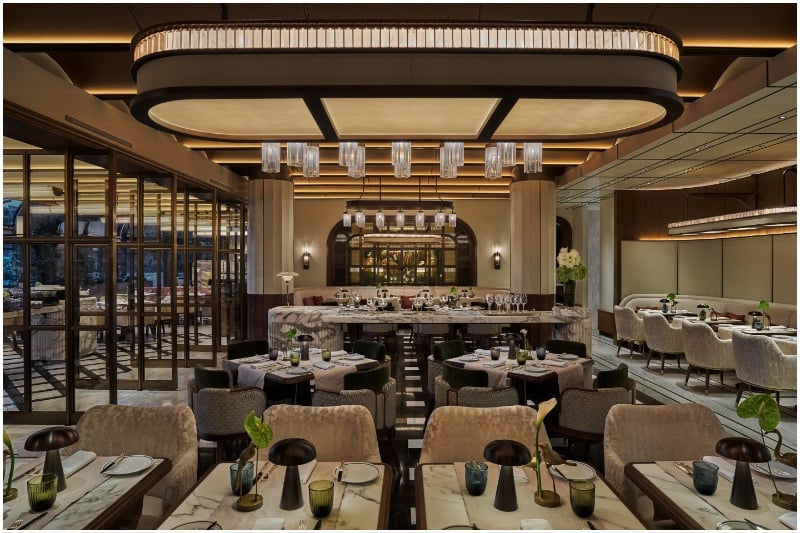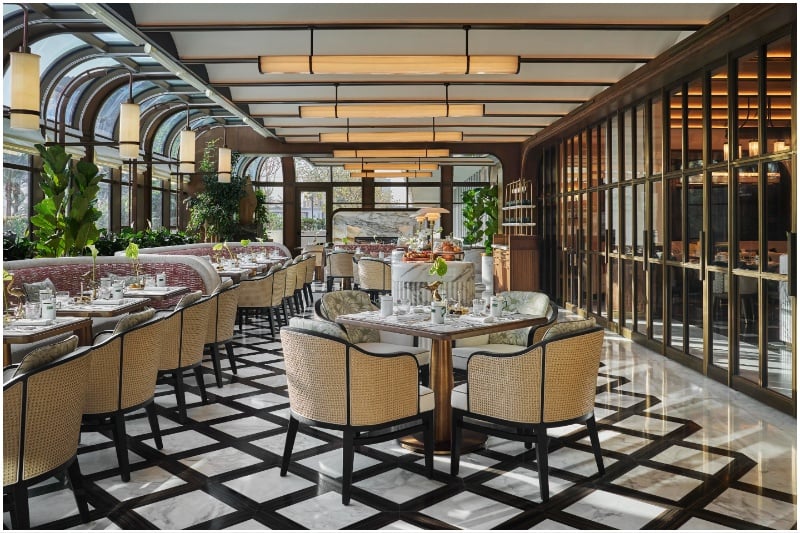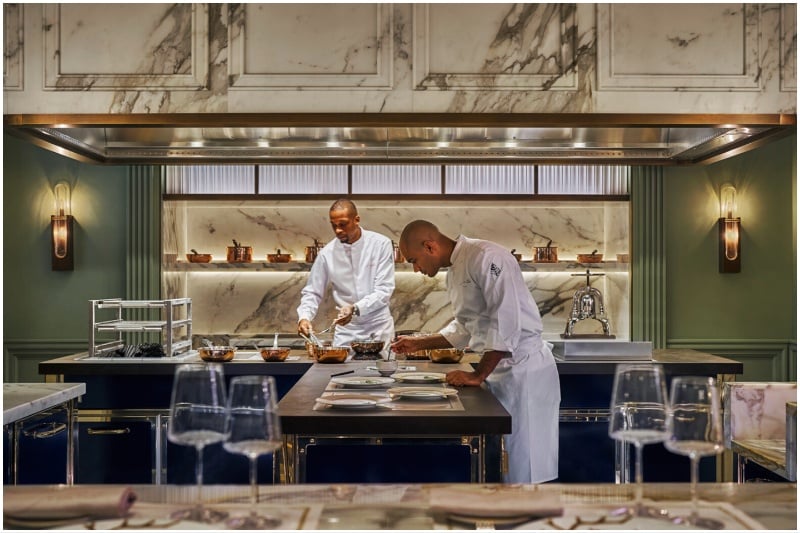What’s On in conversation with: Chef Daniel Boulud
A chat with one of the world’s most loved chefs, the man simply known as “DB”
When Chef Daniel Boulud enters the Café Boulud dining room, there’s a change in the atmosphere. His stride is long and confident, his smile on. He waves, shakes a few hands. Heads turn, and dining is momentarily interrupted out of respect, even awe.
Though he’s not a tall man, Chef Boulud has the stature of a giant in the universe of haute cuisine. Those who appreciate nuanced cooking and the ability to turn the gifts of the earth into culinary art count the French-born chef among history’s greatest.
View this post on Instagram
Not only has his restaurants earned a multitude of Michelin stars, but Chef Boulud has also created an international restaurant empire with locations in the United States, Canada, Singapore, and Dubai.
Growing up on a farm in Lyon, Chef Boulud dedicated his life to cooking at a young age and would go on to establish himself in New York. Much of his time now is spent on nurturing young talent, with many of his protégés becoming celebrated chefs themselves. Meeting him is to understand that the secret to legendary success doesn’t come down to just skill and ambition, but also passion, resilience, and character.
What’s On Saudi Arabia caught up with Chef Boulud when he was in Riyadh a few weeks ago at Café Boulud at the Four Seasons Hotel Riyadh at Kingdom Centre for its first anniversary celebration.
What’s On: Congrats on the first anniversary of Café Boulud at Four Seasons Hotel Riyadh. How would you describe the journey one year on?

Chef Daniel Boulud (DB): It’s very exciting to be here in Riyadh, and to be at the Four Seasons Hotel. We’ve established a strong reputation for our restaurant as one of the top dining options in the city. We have a loyal stream of regular customers, which is very important to us. It’s crucial to earn their loyalty and appreciation for our cuisine, service, and setting. We strive to meet all that Riyadh expects from us.
What were some of the biggest challenges or surprises in bringing French cuisine to Riyadh?
DB: Well, I think we don’t try to impose a style that might not be the right kind of cuisine. We first study the local scene – what’s available here, what people like, and how they prefer things. Then we aim to stay true to our DNA of cuisine and our menu, but we also adapt to make it comfortable for the locals. At the same time, they want brands to come here and be able to express who they are. When these brands visit New York and come to our restaurant, they appreciate what we do, and I believe they want a part of that experience here too. It’s important to strike a balance between maintaining the authentic hospitality standard of New York and making people feel at home and happy. We learn from our regular customers about what they miss, which makes it easier to offer personalised service. You can’t assume everyone everywhere likes the same style of food. There’s a mix of expats, visitors, business people, and locals. We try to balance all these influences to make sure it suits everyone well.
If I were arriving directly from Paris here, I think it would be much harder to adapt. Coming from New York City, we’re already dealing with such a cosmopolitan environment because it’s a melting pot of cultures. And while I am very French, I don’t consider myself that French when it comes to creating a local menu. We try to look at the supply, as the ingredients are important for identifying which are the most consistent. Then we focus on sourcing local ingredients and working with local suppliers as much as possible, while also considering the quality of imported items. We ran a restaurant in Dubai for 5 years, so we already know a bit about the Middle East from that experience. There are similar suppliers operating here in Riyadh as well.
How would you describe the dining experience at Café Boulud in Riyadh throughout the day?
DB: There are different types of occasions. Breakfast and lunch are unique, with the restaurant filled with plenty of light, creating an almost outdoor-like atmosphere indoors. It’s a distinctive spot for lunch. We aim to develop business and social lunch options, especially catering to ladies. Naturally, breakfast at the hotel is also very busy. Then, there’s dinner, which serves as another destination; its atmosphere is cosier and more relaxed. We also serve brunch, currently every Friday, with plans to possibly extend to Saturday as well. It would be pretentious to claim we are the best brunch destination in Riyadh, but we have created something new – a buffet brunch with plenty of options and beautiful food. Have you seen it? There’s something for everyone, with high quality and variety, including options for children. We’re trying to confirm whether to add brunch on Saturday too, but it remains tentative. Additionally, we offer weekday lunches and many dinner choices. Afternoon tea is also available in the lounge, which is popular among ladies.

Café Boulud Riyadh was recently recognised at the What’s On Saudi Arabia Awards 2025. What do you think has set Café Boulud apart to earn such recognition in such a short time?
DB: Firstly, the place is stunning. I don’t believe there are many restaurants of such quality. I think our reputation in New York for Café Boulud is that it’s a place you can visit regularly or on special occasions. You might go when you travel; you can visit Café Boulud in Palm Beach, the Bahamas, Toronto, and soon London. You could also consider Riyadh. I believe that, sometimes, depending on the country, the word “café” is misunderstood, but in fact, in French, “café” is a place you can go almost all day, offering something sophisticated, like the long-established coffeehouse and celebrity haunt Café de Flore in Paris, or Café Royal Grill in London. It’s a very sophisticated, yet casual concept.
In addition, we think Julien winning Newcomer of the Year at the What’s On Saudi Arabia Awards 2025 is a big milestone. What was your reaction when you heard the news?
DB: It was exactly what we wished for because Julien is the gem. It’s unique. I don’t think Julien is about creating a business model that sustains the restaurant, but rather about creating a jewel within the restaurant itself. We operate it a few days a week with a special menu, which has been our goal from the start: to create a unique experience here that no other restaurant in Saudi Arabia offers.

Additionally, it’s the ideal type of restaurant that can be rented out privately. A small group can hire the entire venue, customise their own menu, and even have their own chef preparing the dishes. Looking ahead, Julien’s future plans include inviting colleagues and guest chefs from other regions such as the Middle East, Asia, or Europe – possibly from America – to take over the counter. This would represent the next phase. We also aim to partner with a brand and associate their identity with the restaurant, turning it into a collaboration. I believe this could be pretty exciting, as Julien’s concept has evolved from providing a unique experience of being in the kitchen and sitting at the counter to also welcoming guest chefs.
One last question: What are your thoughts on the Michelin Guide arriving in Saudi Arabia?
DB: I find this very exciting. It’s still early, but many restaurants have already established themselves here. Some named chefs are beginning to arrive, and of course, Michelin often focuses on chef-driven establishments. The restaurant and cuisine need to resonate, and I think that’s wonderful. For us, at Café Boulud, we currently hold one star in New York. I believe Café Boulud could definitely deserve a star here. But, of course, Michelin is the final decision-maker. I also think Julien could certainly earn two stars in the future, which we are aiming for. We set the standard for Café Boulud here in Riyadh at a one-star level. Both our brand and the venue’s value our reputation and standards, and I believe we can meet them. At the same time, we want to remain approachable, affordable, and high-quality for the local community. We don’t want the restaurant to be seen solely as a destination for tourists and businessmen.
Images: Supplied
